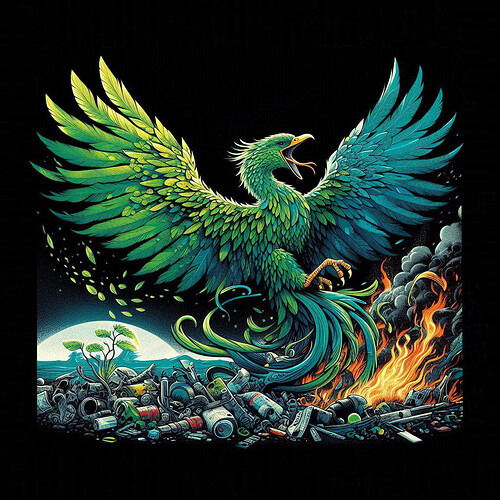It was something that completely shattered my worldview and forced me to rethink everything I believe. It has dominated the course of my life, in all sorts of ways. It is the foundation of my worldview.
It’s all about how you internally perceive what may be happening in the “real world”. You can’t easily separate the two.
I think it is easier than we have been led to believe. Becoming collapse-aware is arriving at an understanding about the extent and intractability of our systemic problems. This isn’t subjective. It reflects something in the objective structure of reality. This is why realism is so central to everything I say.
I believe the claim that collapse is inevitable ranks among those statements that we should be able to agree is objectively true. We need to be clear exactly what that means, but I think that is perfectly possible too.
Also, there’s no way of knowing whether this conveyer belt into nothingness won’t eventually result in something insightful and productive.
There is nothing productive going on at r/collapse. If you so much as attempt to make positive noises about the future, the result is deep psychological-emotional turmoil. The majority response is a mixture of derision and anger. These people are sick and tired of the bullshit. They want something REAL. And all they are being offered at the moment is collapse.
If people have no idea how to react to some threat - it may be best not to panic
Do you see me as “panicking”?
I haven’t felt panic like that since before I went into the psychiatric hospital. I am a million miles away from panicking. What you see is not panic. It is a call to action. Panic immobilises people – it stops them from thinking.
Here is the beginning of the introduction to my book:
Introduction
We live in an age of deepening fear, anger and confusion. It feels like societies worldwide are falling to pieces, and any remaining hope that we can avoid a more comprehensive collapse is steadily draining away. Many of us react to this escalating chaos by searching for someone to blame, but this approach yields few effective solutions to our problems or meaningful responses to our predicaments. There is no shortage of opposition to the status quo, but it lacks structure and there is nothing resembling an ideology that could bring enough people together to make much difference to the general direction of world events. Most of us aren’t even looking for a unifying ideology – we have collectively given up hope that such a thing is even possible. And all the time we’re accelerating towards social, economic and ecological catastrophe.
I am not interested in peddling false hope (“hopium” in collapse-aware lingo). This book would have been a lot easier to write if I’d been willing to engage in that sort of business, and it would also have had a much larger potential audience. I believe a significant degree of collapse can no longer be avoided; the process has already begun and is gaining momentum all the time. It is not that it is physically impossible to avoid the catastrophe – even without any implausible technological advances (“techno-hopium”), we could avoid disaster if only we could sort out our political-ideological problems. And it’s not that these problems aren’t theoretically solvable in the long term, either. What makes catastrophe inevitable is that we do not have centuries, or even decades, to figure out solutions. We have run out of time. Perhaps it would be more accurate to say that we ran out of time at least 30 years ago and we have now reached the point where this should no longer be the subject of serious debate. How long can we go on saying “We must act now or it will be too late”? How late must it be before that message is no longer appropriate? Too late for what, exactly?
This book is not so much about collapse itself as it is about how acknowledging collapse could serve as a catalyst for radical transformation. We cannot afford to stop thinking. Giving up all hope for the future might relieve some of the psychological anguish, but it serves no other purpose than ending the conversation. A real future is coming and we must prepare and adapt, and that means we need to think about it and talk about it much more openly, honestly and realistically than we are now. Where do we go from here? Can we justify any sort of hope for a brighter future? Or must we face the conclusion that Homo sapiens is an evolutionary dead end, and that the sooner we go extinct, the better?
The challenge, then, is how to navigate a world in which the pursuit of holistic understanding has become nearly impossible. Without a coherent framework to guide us, the fragmentation of knowledge mirrors the fragmentation of our society, leaving us grasping at disconnected pieces of truth. If we are to make sense of the complexities facing us – let alone respond to them – we must find a way to think and act beyond the limits imposed by our current cultural systems. This is not about rejecting expertise or dismissing the value of specialised knowledge, but about recognising the urgent need for synthesis: a way of connecting insights from disparate fields and perspectives in search of a bigger picture.
Does that sound like panic to you?
